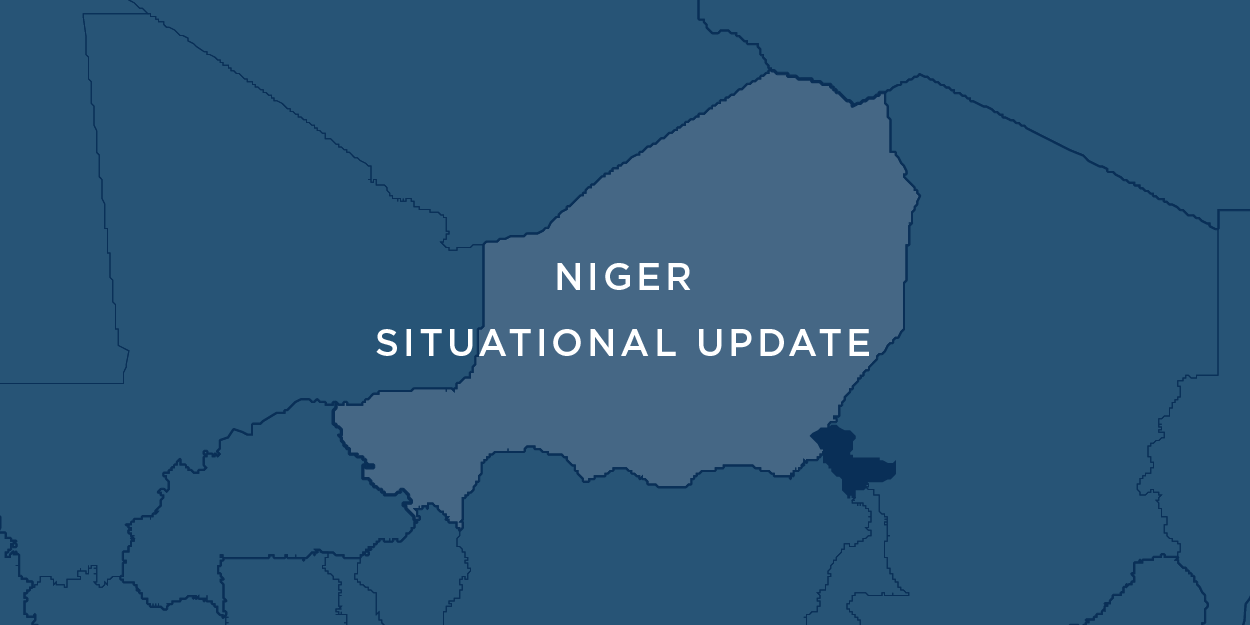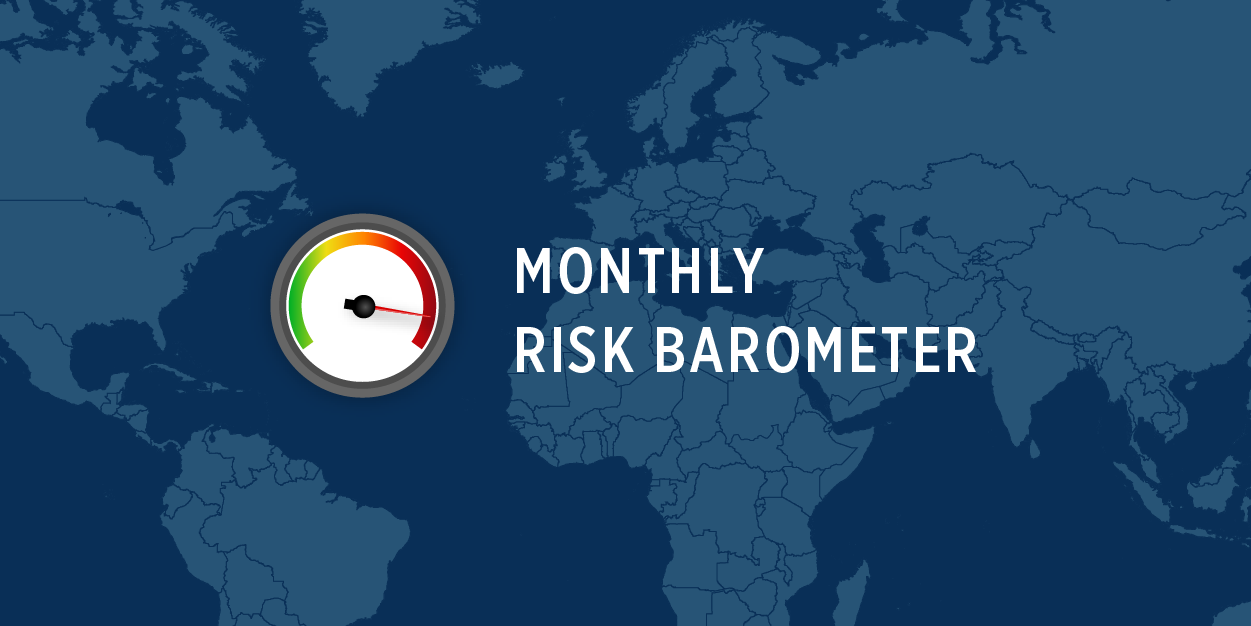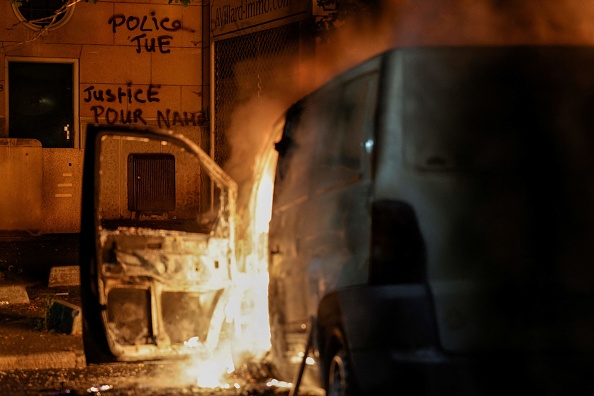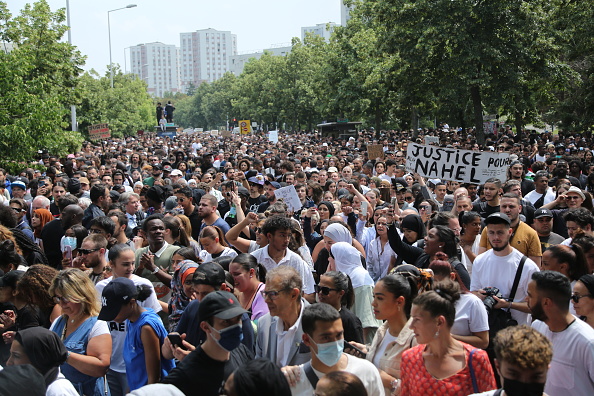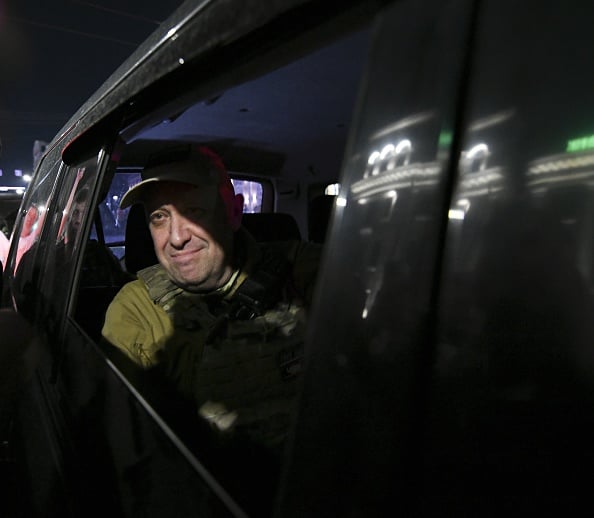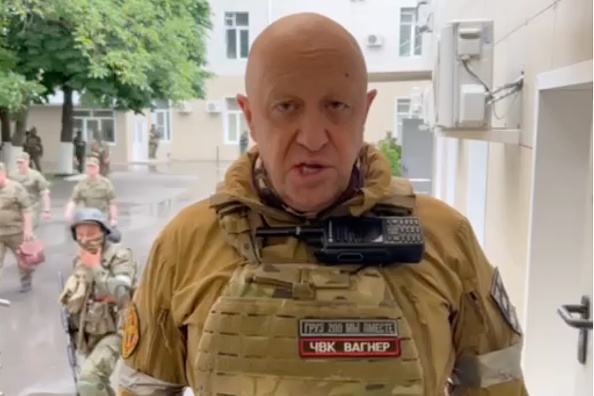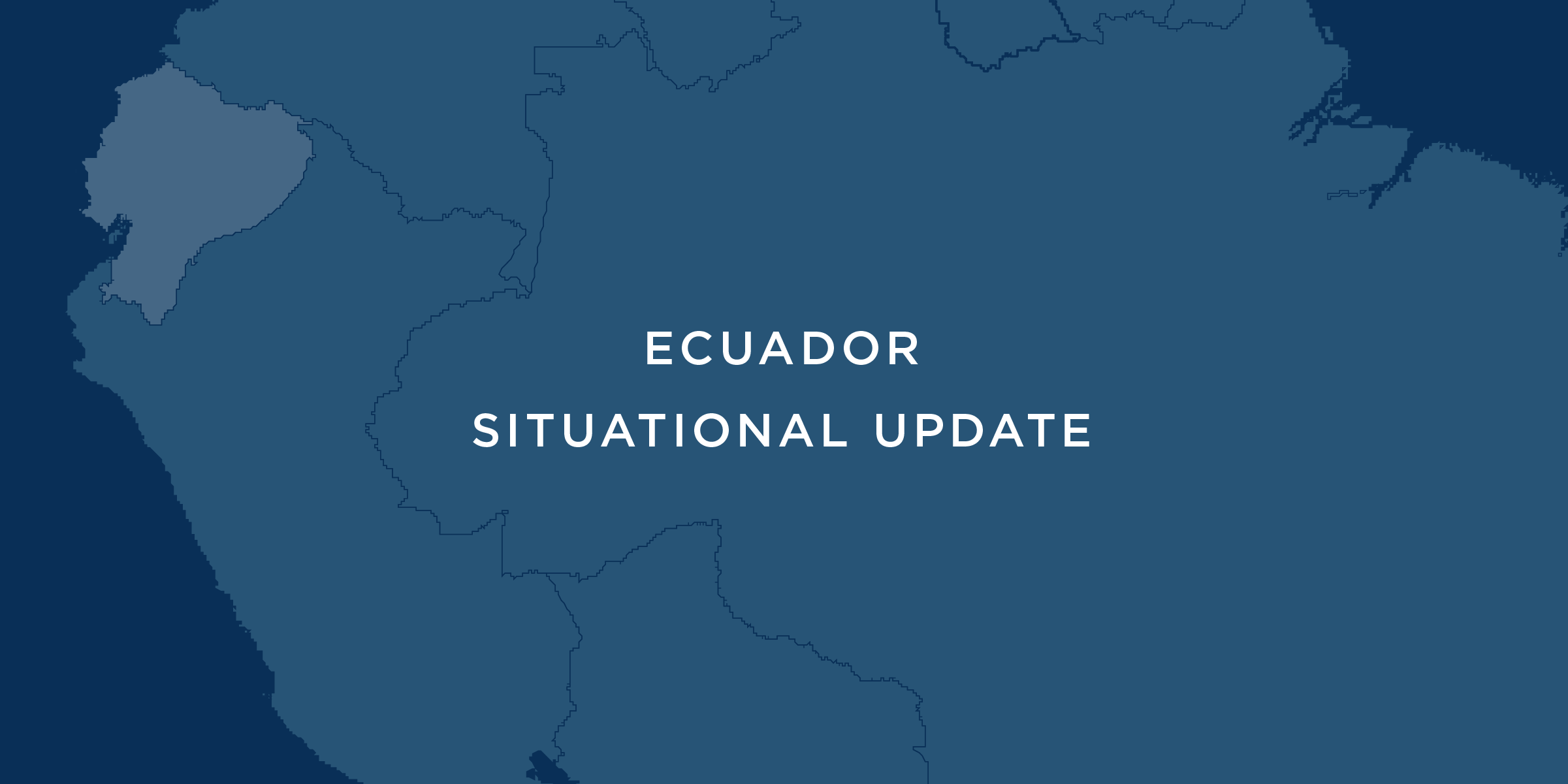In Global Guardian's monthly Risk Barometer, our Intelligence Team highlights current global hotspots with the potential to impact your business operations and travels. Read below for analysis on the threats we are closely monitoring this month and click here to subscribe for regular intelligence updates.
West Bank Instability Points to Worsening Ground Conditions and Underscores the Increasing Likelihood of MulTi-Front War
On 03 July, Israeli forces launched a large-scale counterterrorism operation targeting militants in the West Bank city of Jenin. The operation involved over 1,000 soldiers and fighting marked the most significant flare-up between Israel and Palestinian militants since 2022, and Israel's largest operation in the West Bank since 2005. This round of violence is not isolated and is not over. Overall, the limited Israeli campaign indicates a shift in the Israeli security paradigm, one that presages heightened conflict risk in the medium term.
Starting at approximately (01:00) local time and lasting around 48 hours, the raid saw a significant number of Israeli airstrikes, some using drones and helicopters and a combined brigade of ground forces. The clash resulted in seven Palestinian deaths, over 90 Palestinian injuries, and eight wounded Israeli soldiers, including one fatality. The stated target of the operation was a “joint war room” for the Jenin Brigade, and Prime Minister Benjamin Netanyahu has stated that this will not be the last Israeli operation in Jenin.
- Global Guardian recommends against travel to the West Bank cities of Jenin and Nablus.
- We recommend pre-trip intelligence prior to all trips to Israel.
- This event highlights the increasing medium-term conflict risk in the Middle East.
Context
Owing to the weakness and unpopularity of the Palestinian Authority (PA) – (80% want President Abbas to resign) – a major paradigm shift in the Israeli-Palestinian Conflict occurred in June 2021 when Palestinian Islamic Jihad (PIJ) Jenin commander Jamil al-Amouri and two Palestinian security forces officers were killed during an Israeli raid. In the ensuing year, Iran saw an opportunity to capitalize on the situation and began to increase its support to its Palestinian partners.
Last year’s cyclic violence drove a chain of events that produced another Israel-Gaza war in August 2022, an Israeli decapitation operation of PIJ leadership in Gaza in May 2023, and the largest uptick in terror attacks within Israel, corresponding with more Palestinian deaths than any other point since the Second Intifada. The Palestinian Streets now overwhelmingly believes that armed “resistance” is a viable way of achieving both statehood and the dissolution of Israel, two aims that are inextricably linked.
Meanwhile, after a seven-year hiatus, rockets ostensibly launched by Palestinian factions in Southern Lebanon – but with the tacit consent, if not direct orders from Hezbollah – have been fired into Israel on several occasions in the last two years (most notably on 06 April when 34 rockets were fired in the largest salvo since the 2006 Israel-Lebanon War). These attacks highlight the increasingly tight relationships between various Palestinian militant groups and Tehran. More importantly, rocket attacks from Lebanon have now become normalized, cementing the linkage between the Israeli-Palestinian Conflict and the shadow war between Israel and Iran. Iran has now managed to cement the link between flare ups in West Bank and its broader campaign to eliminate Israel.
Recent Events
- 19 June – An Israeli military vehicle is severely damaged in a complex ambush in Jenin, resulting in a major shootout that necessitated the dispatch of an Israeli Apache helicopter to cover the extrication. This incident marks the first time an Israeli attack helicopter was deployed in the West Bank in over 20 years.
- 20 June – Two Palestinian gunman shoot and kill four Israelis at a gas station in the Eli settlement, near Nablus, West Bank.
- 20 June – Israeli settlers set homes, cars, agricultural fields, and an ambulance ablaze in areas of Nablus governorate, West Bank, including Huwara and Al-Lubban ash-Sharqiya.
- 21 June – A mob of extremist Israeli settlers kill one Palestinian, injure nine others, and set fire to at least 60 vehicles and 30 residences in Tumusai'ya, Ramallah, West Bank.
- 21 June – IDF drone strike targets PIJ and Al-Aqsa Martyrs' Brigade militants in a vehicle north of Jenin, West Bank for first time since 2006.
- 24 June – Israeli security forces thwart a terror attack at Qalandia Checkpoint outside Jerusalem; Al-Aqsa Martyrs Brigades claim responsibility.
- 04 July – A combined car-ramming and shooting attack injures 10 in Tel Aviv.
- 06 July – Rocket launched from Lebanon targets northern Israel; Israel responds in kind.
- 09 July – Israeli police foil stabbing attack at Giv'at Hatahmoshet light rail station in Jerusalem.
Analysis
Israeli security operations in the West Bank undermine the Palestinian Authority’s legitimacy and in turn, contribute to the strengthening of Iran’s Palestinian partners, namely Hamas, PIJ, and Lion’s Den (whose fighters hail from various Palestinian factions, including Fatah’s armed wing). Yet as these various Palestinian militant groups increase their hold on the cities of Jenin and Nablus in the vacuum left by a weakened PA, they come closer to developing local weapons manufacturing that will ultimately culminate in the West Bank becoming another platform for which Iranian-assisted groups can launch rockets into Israel. But as opposed to Gaza, Southern Lebanon or Syria, the West Bank is within the Israeli heartland and no sophisticated missile defense system would be able to prevent rockets falling on Israel cities – and Israel’s sole major international airport, Ben Gurion (TLV) – from just a stone's throw away. Therein lies the dilemma: Israeli raids – necessitated by proximate security issues and the preservation of deterrence – create the conditions, namely increased support for the militant factions, that will necessitate future raids. Yet with every operation, the risk that Iran elects to open a multi-front war on Israel increases.
This latest military operation was as much about signaling to Iran and “reestablishing” deterrence as it was a response to the worsening security situation in the West Bank after the 19 June ambush on Israeli forces. Prima facie, one might conclude that mutual deterrence offers a stabilizing regional dynamic. Afterall, in the last half year or so, the Saudi/Emirati/Egyptian-Qatari rift has been mostly resolved, Syria-Arab League normalization is underway, and China brokered a diplomatic détente between Saudi Arbia and Iran. However, the opposite is true. The more Iran tightens its “ring of fire” around Israel and the more the Sunni Arab states prepare for a nuclear threshold state in Tehran, the more cornered Israel will become. And owing to Israel’s persistent existential threat and the legacy of the holocaust, Israel has set a precedent of taking unilateral military action in such circumstances.
Key Takeaways But for Israeli’s operation in August 2022 that depleted PIJ’s rocket stockpiles and eliminated key leadership, it’s possible that this military operation could have prompted another round of fighting with Palestinian factions in both the West Bank and the Gaza Strip. The structural conditions are in place for the next Israeli-Palestinian flare up to culminate in a multi-front war. As Iran continues to inch towards nuclear threshold status – an event which Israeli Prime Minister Netanyahu has sworn to prevent – and with the linkage of the Israeli-Palestinian conflict and the shadow war with Iran having now been cemented, a Palestinian terrorist attack or an Israeli raid in the West Bank carries with it the acute possibility of triggering a chain of events replete with regional escalation risks. |
Security to Decline Following UN Pullout Request
On 30 June, the United Nations (UN) Security Council formally voted to withdraw its 13,000 peacekeepers from Mali. The vote follows the Malian military junta’s request for the UN to withdraw. Having expelled French forces last year, the UN withdrawal will leave the military-run government with no state backing in a tough fight against Tuareg separatists and jihadist al-Qaeda affiliates who control large swaths of the northern part of the country. Instead, the junta has chosen to rely on the – now tenuous – support of the Wagner private military company. The UN withdrawal will likely result in a resurgence of jihadist forces in the north of the country and a further destabilization of the region.
The UN Multidimensional Integrated Stabilization Mission in Mali (MINUSMA) set a 31 December deadline to conduct an “orderly and safe” withdrawal from Mali. After MINUSMA has fully drawn down, the only force in Mali other than the Malian military will be the roughly 1,000 Wagner fighters stationed there. The swapping of UN and French security assistance to Wagner is motivated by desire to clamp down on domestic opposition ahead of elections slated for February 2024 without any form of international oversight.
- Global Guardian forecasts a decrease in stability and security; and advises those with assets in Mali to start devising evacuation plans for in-country personnel.
- Avoid all non-essential travel to Mali, particularly outside of Bamako.
- For essential travel in Bamako, use low-profile protected vehicles and executive protection.
- The proposed February 2024 elections may serve as a flashpoint event.
Context
The Junta, who took power in 2020 and 2021 coup d'etats, has come to rely more and more on the suite of security services offered by Condor Group (Wagner’s parent company). The services offered by Condor are not limited to providing mercenaries but extend to information warfare, political technology consultants, and the harassment or murder of journalists. Condor and Wagner’s presence in Mali was a major source of tension with MINUSMA and the French missions. UN officials have criticized the Malian government as having shortsightedly chosen regime security above national security.
Event Timeline
- April 2012 – The National Movement for the Liberation of Azawad (MNLA) – a Tuareg separatist movement – and Jihadist-associated Fulani militias seize an area the size of France in northern Mali
- January 2013 – France launches a military intervention that stops the southward advance of the Jihadists and separatists (who had turned on one another)
- 2013 – MINUSMA intervention force is deployed
- 2015 – UN-orchestrated peace deal, the Algiers Accord, is signed between the MNLA, other separatists, and the Malian government
- 2020 – Military coup overthrows provisional government
- 2021 – Second military coup solidifies Junta control
- 2021 – UK, Germany, and Sweden withdraw from MINUSMA
- January 2022 – Wagner Group fighters begin to arrive
- 2022 – France withdraws from Mali, largely due to increased Wagner presence
- February 2023 – Mali votes not to condemn Russia’s invasion of Ukraine
- June 2023 – UN votes to recall MINUSMA
LOOKING FORWARD
While Wagner fighters are often quite effective, they also have a history of human rights abuses in Mali and lack the air support, heavy weapons, and numbers necessary to provide the same level of security as the 13,000 strong MINUSMA mission. The 2015 Algiers Accord peace deal brokered by the UN with the Tuareg separatists is not likely to hold under Wagner. A coalition of separatist groups called Permanent Strategic Framework for Peace, Security and Development (CSP-PSD) already pulled out of talks stemming from the Accord in late 2022. Should the Algiers Accord fail, the Tuareg groups will likely attempt to secure their hold on territory in the north. They may even seek some accommodation with their former allies, the largely Fulani Jihadist groups.
Previous advances by the Jihadist Jama’at Nasr al Islam wal Muslimin (JNIM) resulted in Timbuktu falling and advances towards Bamako. The resumption of fighting between the government and Tuareg forces could leave the door open for even further advances by JNIM. The Jihadist groups for their part could use the chaos of the upcoming 2024 election, and the Junta’s attempt to use force to subvert it, as an opportunity to galvanize support and advance south. The 1,000 Wagner fighters are not sufficient to protect against these advances and the Malian state may approach collapse.
The Junta made its decision to rely on Wagner at a time when Wagner could be reasonably interpreted to be acting with the approval and backing of the Russian state. Following Evgeny Prigozhin’s mutiny late in June, this assumption is now in question. Despite public assurances from Russian Foreign Minister Lavrov that Russia will stand by its allies in Africa, it is unclear the extent to which the arms of the Russian state are willing or capable of filling Wagner’s shoes. Wagner fighters are rumored to have been drawn down in Syria and Central African Republic.
Key Takeaways The security situation in Mali is primed to deteriorate in both the north and in Bamako. Wagner is emerging as the only foreign force buttressing the Junta but lacks the power to maintain stability outside of the capital. The peace process between separatists and the Malian government is already showing signs of faltering and Jihadist groups are poised to take advantage of the chaos. |
Drought leads to water Crisis in Montevideo
A multi-year drought in Uruguay has led to a water crisis impacting the capital Montevideo, putting more than 1.6 million people at risk, and raising concerns over future hazards from drought and water shortages as the earth continues to warm. The shortage caused authorities to begin mixing brackish water from the Rio de la Plata estuary with dwindling fresh water supplies, triggering warnings to those with kidney disease, high blood pressure, and other issues. In June, thousands of people took to the streets of Montevideo to protest the water shortage and mixing of salty brackish water into drinking supplies. The government is attempting to mitigate the risks by importing bottled water, drilling wells, and constructing new reservoirs.
- Global Guardian advises against drinking the tap water in Uruguay and recommends monitoring the availability of bottled water prior to travel in the short term.
- Ongoing shortages could lead to severe water rationing in households and business for bathrooms, kitchens, laundry, etc.
- Serious unrest is possible should the water crisis escalate.
Context
Uruguay is in the midst of a historic multi-year drought, with high temperatures and limited rainfall culminating in a water crisis in the capital region. Water levels in the Pasa Severino reservoir are at just 10% of capacity according to the Obras Sanitarias del Estado (OSE). Periodic rainfall will not be enough to replenish the reservoir. At least two inches of water per day over a 30-day period are required for water levels to recover. In addition to the drinking water crisis, farmers are struggling with declining crop yields and livestock problems.
The government has taken the following steps to mitigate the crisis:
- Importing more than $12,000,000 a month in bottled water for residents of the capital region
- Eliminating the tax on bottled water
- Purchasing multiple 150,000-liter desalination plants to be used for hospitals and other critical locations
- Digging new wells in Montevideo
- Evaluating a new reservoir project on the San Jose River
There have been multiple protests against the government’s handling of the water shortage, with some blaming ranchers and others accusing “exploitative” industries for using too much water.
Looking Forward
On 06 July, Uruguay’s Congress unanimously approved the Water Emergency Fund to finance access to bottled water among other measures. On 08 July, Argentine President Alberto Fernandez offered help to Uruguay in the form of a mobile water treatment plant, supplies, and personnel. Uruguay’s President Luis Lacalle Pou thanked his counterpart but turned down the offer for the moment, claiming the situation was dynamic and that it had recently rained. Without serious rainfall, the water crisis will continue, and the government will be forced to buy bottled water for the entire capital region.
KEY TAKEAWAYS Montevideo is the first capital city to effectively run out of drinking water despite Uruguay being the first country in the world to enshrine access to water as a fundamental right in a 2004 constitutional amendment. The government is now spending tens of millions of dollars each month importing bottled water, building water desalination plants, and digging new wells. The water crisis highlights the risks from severe drought and rising temperatures which lead to increased water consumption. Other countries facing near-to-medium term water crisis risks will soon face the prospect of unrest and high costs of importing water without prompt action. |

